Abstract
The cheA locus of Escherichia coli, which is required for chemotactic behavior, encodes two polypeptide products designated p[cheA]L and p[cheA]S. The mode of synthesis of these two proteins was investigated by transferring various missense and nonsense mutations to a lambda transducing phage and observing the mutant cheA products made after infection of ultraviolet-irradiated host cells. Missense mutations had no effect on either the size or the relative amounts of the two cheA polypeptides. Most nonsense mutations caused premature translational termination of both cheA products, indicating that p[cheA]L and p[cheA]S must be translated from the same coding sequence in the same reading frame. Two exceptional nonsense alleles at the promoter-proximal end of cheA made an intact p[cheA]s but no detectable p[cheA]L. These findings show that the cheA locus may contain two different sites for initiation of translation. The synthesis of both proteins can be effected by the same promoter, but it is not yet clear whether both are translated from identical mRNA molecules. Complementation studies of cheA mutants provided evidence for two functional activities, one associated with the amino terminus of p[cheA]L and the other with the common portions of p[cheA]L and p[cheA]S. It is possible that each cheA product has a different function required for chemotaxis. The possible roles of these two products and the functional significance of bacterial genes with overlapping coding sequences are discussed.
Full text
PDF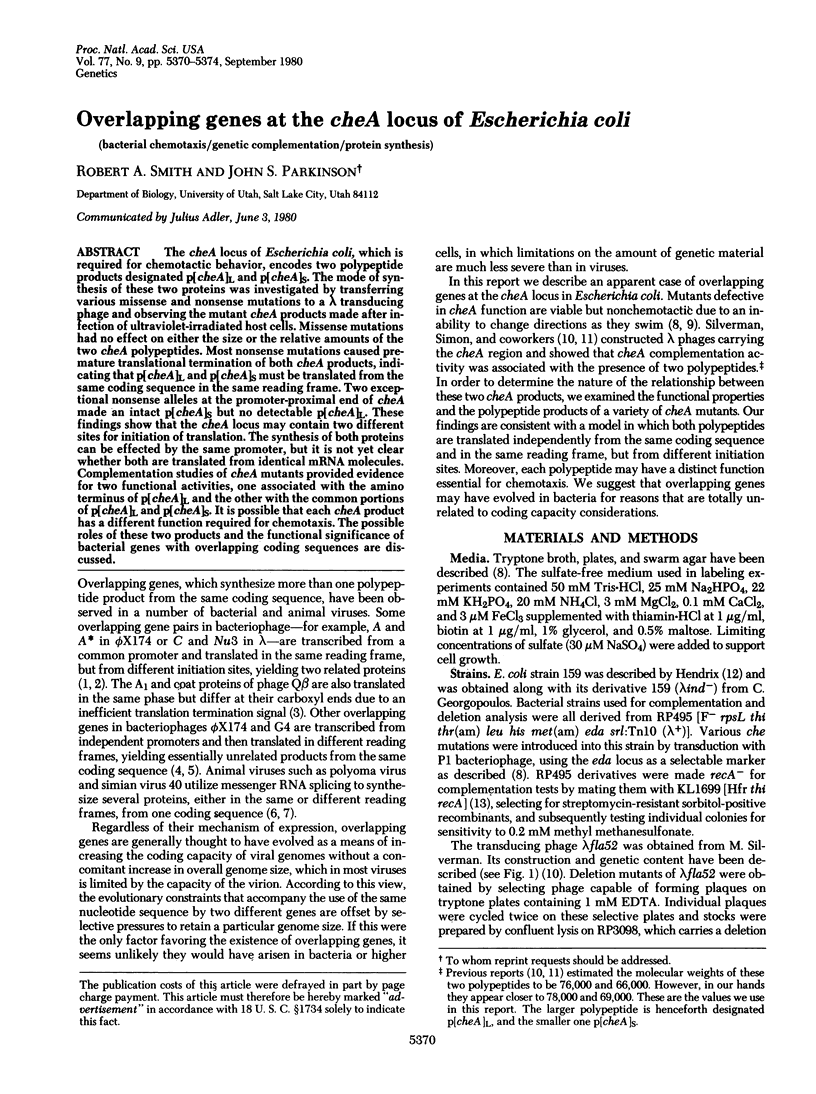
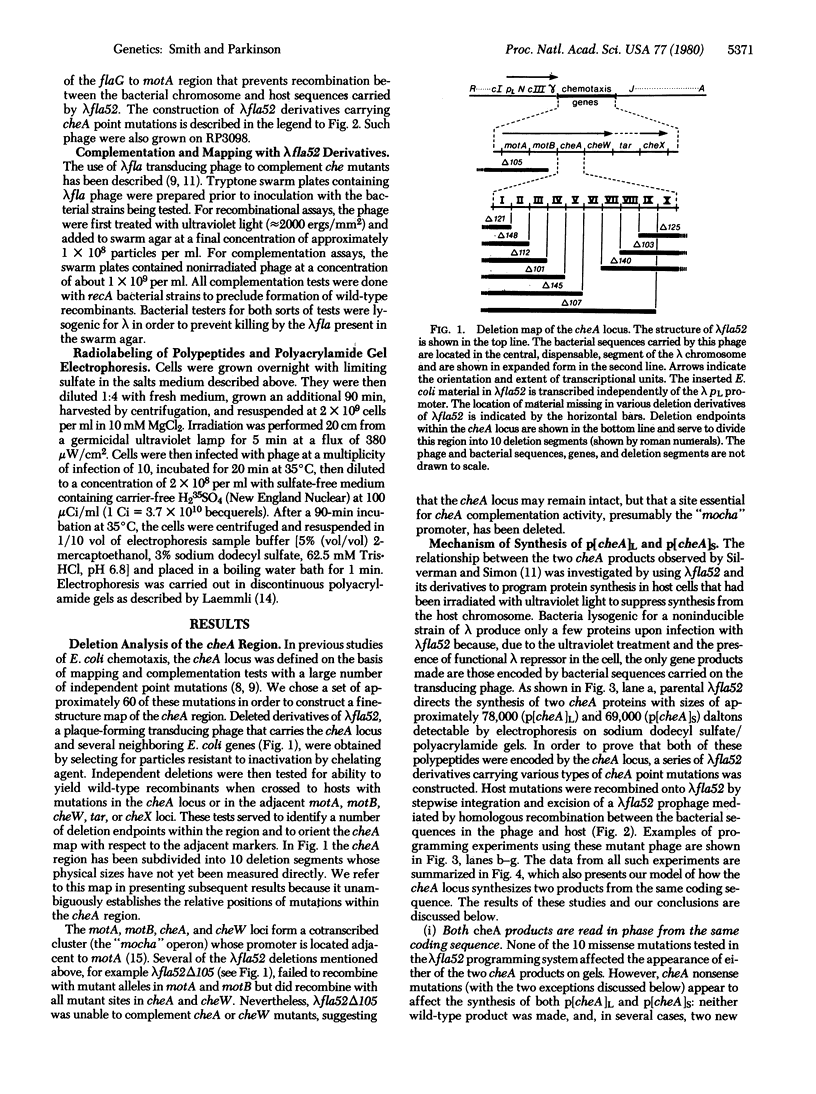
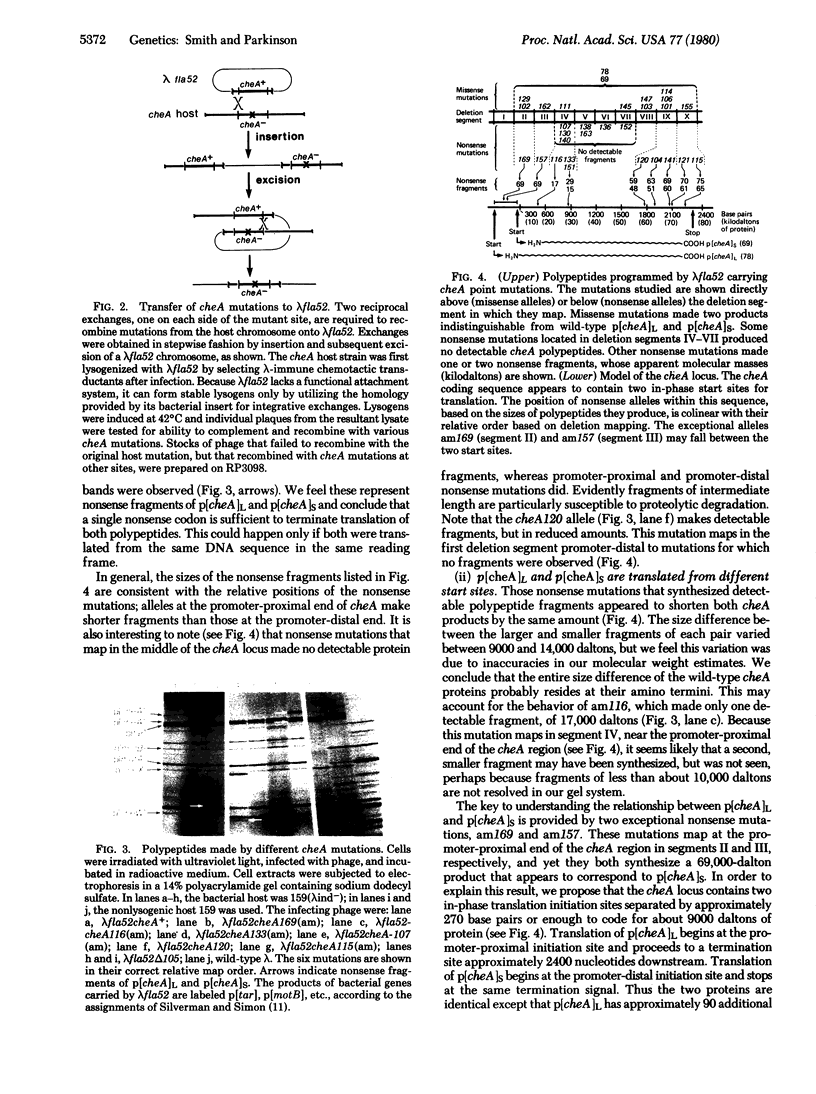
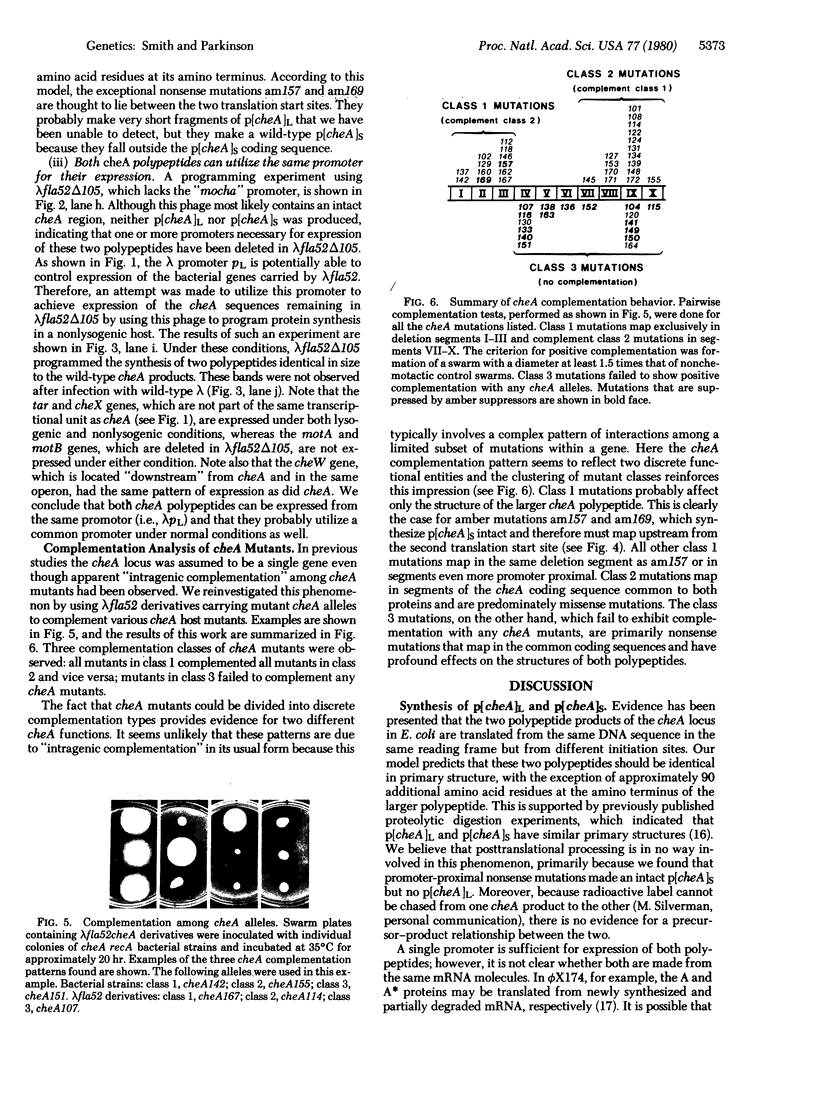
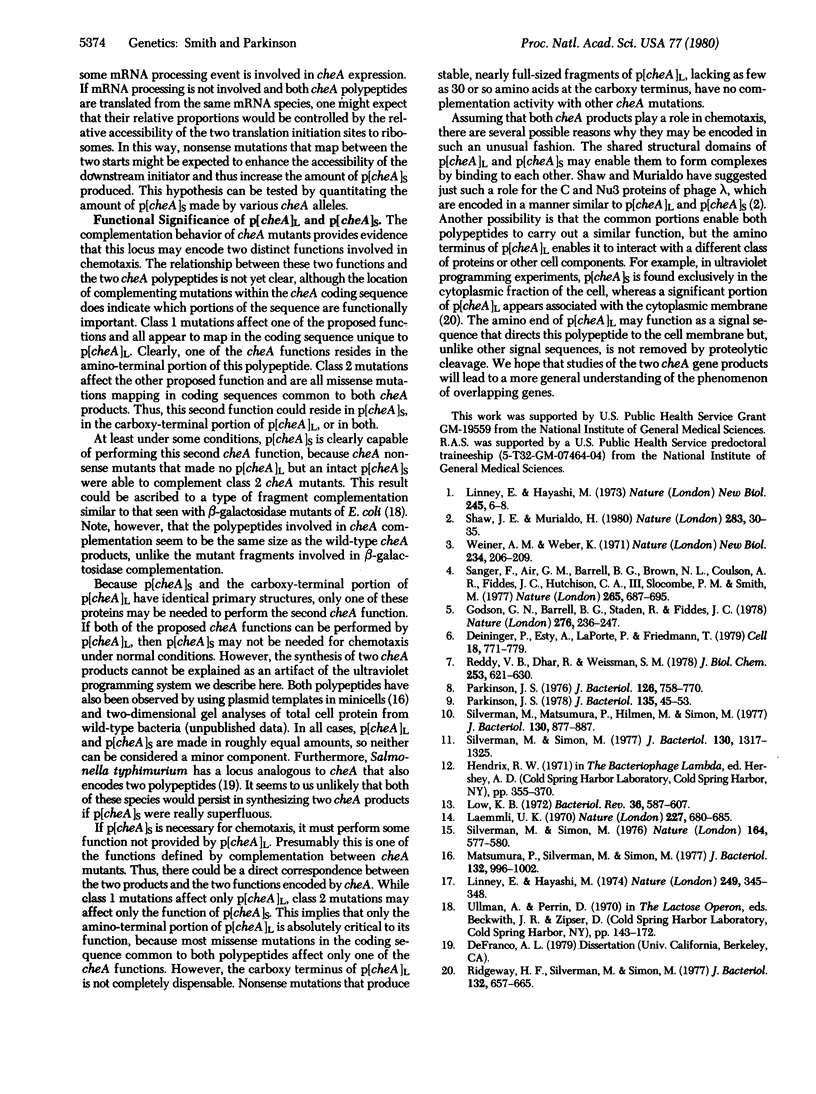
Images in this article
Selected References
These references are in PubMed. This may not be the complete list of references from this article.
- Deininger P., Esty A., LaPorte P., Friedmann T. Nucleotide sequence and genetic organization of the polyoma late region: features common to the polyoma early region and SV40. Cell. 1979 Nov;18(3):771–779. doi: 10.1016/0092-8674(79)90130-2. [DOI] [PubMed] [Google Scholar]
- Godson G. N., Barrell B. G., Staden R., Fiddes J. C. Nucleotide sequence of bacteriophage G4 DNA. Nature. 1978 Nov 16;276(5685):236–247. doi: 10.1038/276236a0. [DOI] [PubMed] [Google Scholar]
- Laemmli U. K. Cleavage of structural proteins during the assembly of the head of bacteriophage T4. Nature. 1970 Aug 15;227(5259):680–685. doi: 10.1038/227680a0. [DOI] [PubMed] [Google Scholar]
- Linney E., Hayashi M. Intragenic regulation of the synthesis of phi chi 174 gene A proteins. Nature. 1974 May 24;249(455):345–348. doi: 10.1038/249345a0. [DOI] [PubMed] [Google Scholar]
- Linney E., Hayashi M. Two proteins of gene A of psiX174. Nat New Biol. 1973 Sep 5;245(140):6–8. doi: 10.1038/newbio245006a0. [DOI] [PubMed] [Google Scholar]
- Low K. B. Escherichia coli K-12 F-prime factors, old and new. Bacteriol Rev. 1972 Dec;36(4):587–607. doi: 10.1128/br.36.4.587-607.1972. [DOI] [PMC free article] [PubMed] [Google Scholar]
- Matsumura P., Silverman M., Simon M. Synthesis of mot and che gene products of Escherichia coli programmed by hybrid ColE1 plasmids in minicells. J Bacteriol. 1977 Dec;132(3):996–1002. doi: 10.1128/jb.132.3.996-1002.1977. [DOI] [PMC free article] [PubMed] [Google Scholar]
- Parkinson J. S. Complementation analysis and deletion mapping of Escherichia coli mutants defective in chemotaxis. J Bacteriol. 1978 Jul;135(1):45–53. doi: 10.1128/jb.135.1.45-53.1978. [DOI] [PMC free article] [PubMed] [Google Scholar]
- Parkinson J. S. cheA, cheB, and cheC genes of Escherichia coli and their role in chemotaxis. J Bacteriol. 1976 May;126(2):758–770. doi: 10.1128/jb.126.2.758-770.1976. [DOI] [PMC free article] [PubMed] [Google Scholar]
- Reddy V. B., Dhar R., Weissman S. M. Nucleotides sequence of the genes for the simian virus 40 proteins VP2 and VP3. J Biol Chem. 1978 Jan 25;253(2):621–630. [PubMed] [Google Scholar]
- Sanger F., Air G. M., Barrell B. G., Brown N. L., Coulson A. R., Fiddes C. A., Hutchison C. A., Slocombe P. M., Smith M. Nucleotide sequence of bacteriophage phi X174 DNA. Nature. 1977 Feb 24;265(5596):687–695. doi: 10.1038/265687a0. [DOI] [PubMed] [Google Scholar]
- Shaw J. E., Murialdo H. Morphogenetic genes C and Nu3 overlap in bacteriophage lambda. Nature. 1980 Jan 3;283(5742):30–35. doi: 10.1038/283030a0. [DOI] [PubMed] [Google Scholar]
- Silverman M., Matsumura P., Hilmen M., Simon M. Characterization of lambda Escherichia coli hybrids carrying chemotaxis genes. J Bacteriol. 1977 May;130(2):877–887. doi: 10.1128/jb.130.2.877-887.1977. [DOI] [PMC free article] [PubMed] [Google Scholar]
- Silverman M., Simon M. Identification of polypeptides necessary for chemotaxis in Escherichia coli. J Bacteriol. 1977 Jun;130(3):1317–1325. doi: 10.1128/jb.130.3.1317-1325.1977. [DOI] [PMC free article] [PubMed] [Google Scholar]
- Silverman M., Simon M. Operon controlling motility and chemotoxis in E. coli. Nature. 1976 Dec 9;264(5586):577–580. doi: 10.1038/264577a0. [DOI] [PubMed] [Google Scholar]
- Weiner A. M., Weber K. Natural read-through at the UGA termination signal of Q-beta coat protein cistron. Nat New Biol. 1971 Sep 15;234(50):206–209. doi: 10.1038/newbio234206a0. [DOI] [PubMed] [Google Scholar]




